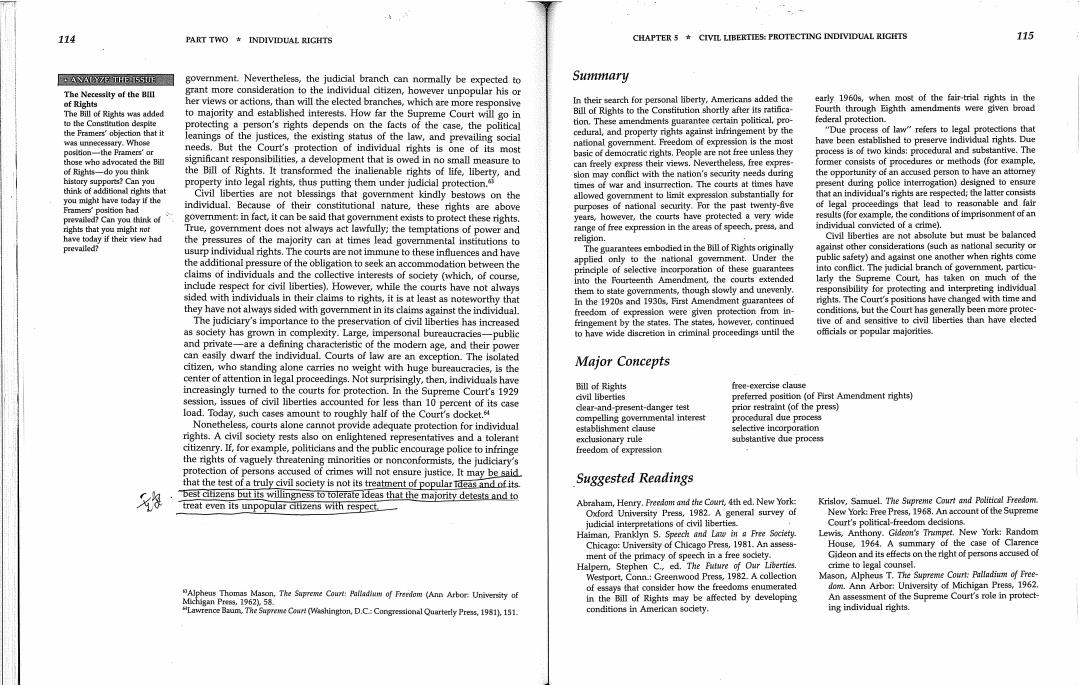正在加载图片...

114 PART TWO INDIVIDUAL RICHTS CHAPTER 5*CIVIL LIBERTIES:PROTECTING INDIVIDUAL RIGHTS 115 +ANAC7FTHE55U正 government.Nevertheless,the judicial branch can normally be expected to Summary The Necesslty of the Bill grant more consideration to the individual citizen,however unpopular his or of Rights her views or actions,than will the elected branches,which are more responsive In their search for personal liberty,Americans added the early 1960s,when most of the fair-trial rights in the The Bill of Rights was added to majority and established interests.How far the Supreme Court will go in Bill of Rights to the Constitution shortly after its ratifica- Fourth through Eighth amendments were given broad protecting a person's rights depends on the facts of the case,the political tion.These amendments guarantee certain political,pro federal protection. the Framers'obje tian that it leanings of the justices,the existing status of the law,and prevailing social cedural,and property rights against infringement by the "Due process of law"refers to legal protections that national government Freedom of expression is the most have been established to preserve individual rights.Due position-the Framers' needs.But the Court's protection of individual rights is one of its most significant responsibilities,a development that is owed in no small measure to basic of democratic rights.People are not free unless they rocesis ofwokinds:proceduraladtative.The those who advocated the Bill the Bill of Rights.It transformed the inalienable rights of life,liberty,and can freely express their views.Nevertheless,free expres- former consists of procedures or methods (for example of Rights-一do you think sion may conflict with the nation's security needs during the opportunity of an accused person to have an attomey histary supports?Can you property into legal rights,thus putting them under judicial protection. times of war and insurrection.The courts at times have presen durin g polloe interrogation)designed to ensure think of additional rights that Civil liberties are not blessings that government kindly bestows on the allowed government to limit expresslon substantially for that an individuare repected;theater had individual.Because of their constitutional nature,these rights are above purposes of national security.For the past twenty-fve of legal proceedings that lead to reasonable and fair government:in fact,it can be said that government exists to protect these rights years,however,the courts have protected a very wide results s(for example,the conditions of imprisonment of an dights that you might not True,government does not always act lawfully;the temptations of power and range of free expression in the areas of speech,press,and individual convicted of a crime). have today if their view had the pressures of the majority can at times lead governmental institutions to Civil liberties are not absolute but must be balanced prevalled? usurp individual rights.The courts are not immune to these influences and have The guarantees embodied in the Bill of Rights originally against other considerations (such as natlonal securityo the additional pressure of the obligation to seek an accommodation between the applied only to the national government.Under the public safety)and against one another when rights come elaims of individuals and the collective interests of society (which,of course, princple of selective incorporation of these guarante nto conflict.The judicial branch of government,particu into the Fourteenth Amendment,the courts extended larly the Supreme Court,has taken on much of the include respect for civil liberties).However,while the courts have not always sided with individuals in their claims to rights,it is at least as noteworthy that them to state governments,though slowly and unevenly. responsibility for protecting and interpreting individual rights.The Court's positions have changed with time and they have not always sided with government in its claims against the individual In the 1920s and 1930s.First Amendment guarantees of freedom of expression were given protection from in- conditions,but the Court has generally been more protec- The judiciary's importance to the preservation of civil liberties has increased fringement by the states.The states,however,continued tive of and sensitive to civil liberties than have clected as society has grown in complexity.Large,impersonal bureaucracies-public to have wide discretion in criminal proceedinuntil the officials or popular majorities. and private-are a defining characteristic of the modern age,and their power can easily dwarf the individual.Courts of law are an exception.The isolated citizen,who standing alone carries no weight with huge bureaucracies,is the Maior Concepts center of attention in legal proceedings.Not surprisingly,then,individuals have increasingly turned to the courts for protection.In the Supreme Court's 1929 Bill of Rights free-exercise clause session,issues of civil liberties accounted for less than 10 percent of its case civil libertes preferred position (of First Amendment rights) load.Today,such cases amount to roughly half of the Court's docket. clear-and-present-danger test prior restraint (of the press) compelling governmental interest Nonetheless,courts alone cannot provide adequate protection for individual estabiishment clause selective incorporation rights.A civil society rests also on enlightened representatives and a tolerant exclusionary rule substantive due process citizenry.If,for example,politicians and the public encourage police to infringe freedom of expression the rights of vaguely threatening minorities or nonconformists,the judiciary's protection of persons accused of crimes will not ensure justice.It may be said that the test of a truly civil society is not its treatment of popular ldeas and of its. Suggested Readings best citizens but its willingness to tolerate ideas that the majority detests and to treat even its unpopular citizens with respect Abraham,Henry.Freedom ad the Court,4th ed.New York: Krislov,SamueL.The Supreme Court and Polftical Freedom. Oxford University Preas,1982 A general survey of New York:Free Press,1968.An acoount of the Supreme judicial interpretations of civil liberties. Court's political-freedom decisions. Haiman,Franklyn S.Speech and Law in a Free Society. Lewis,Anthony.Gideon's Trampet.New York:Random Chicago:University of Chicago Press,1981.An assess- House,1964.A summary of the case of Clarence ment of the primacy of speech in a free society. Gideon and its effects on the right of persons accused o Halpern,Stephen C..ed.The Future of Our Liberties. crime to legal counsel. Westpart,Cann:Greenwood Press,1982.A collection Mason,Alpheus T.The Supreme Court:of Free- Alpheus Thomas Maso of essays that consider how the freedoms enumerated dom.Ann Arbor:University of Michigan Press,1962 in the Bill of Rights may be affected by developing An assessment of the Supreme Court's role in protect- conditions in American society. ing individual rights